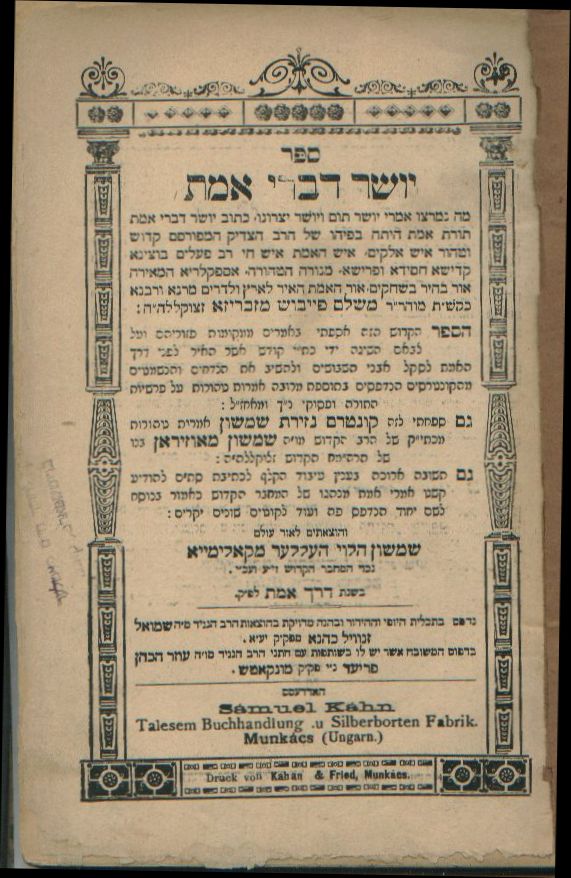Meshullam Feivush Heller on:
[Wikipedia]
[Google]
[Amazon]
Reb Meshullam Feivush Heller of Zbarazh (c. 1742– 12 December 1794) was the author of several
 His older brother, a non-Hasidic Kabbalist and the
His older brother, a non-Hasidic Kabbalist and the
Hasidic
Hasidism, sometimes spelled Chassidism, and also known as Hasidic Judaism (Ashkenazi Hebrew: חסידות ''Ḥăsīdus'', ; originally, "piety"), is a Jewish religious group that arose as a spiritual revival movement in the territory of contem ...
''sefarim
''Sifrei Kodesh'' ( he, ספרי קודש, , Holy books), commonly referred to as ''sefarim'' ( he, ספרים, , books), or in its singular form, ''sefer'', are books of Jewish religious literature and are viewed by religious Jews as sacred. T ...
'' including the Yosher Divrei Emes.
Biography
Rabbi Meshullam Feivush was born to a rabbinic family. His father Harav Aharon Moshe of Sniatin was a fifth-generation direct descendant of Rabbi Yom-Tov Lipmann Heller (author of the ''Tosefes Yom Tov''). His mother was a descendant of Rabbi Judah ben Samuel of Regensburg. Rabbi Meshullam Feivush was also a descendant of RabbisSamson ben Pesah Ostropoli Samson ben Pesah Ostropoli (died July 15, 1648), was a Jews of Poland, Polish rabbi from Ostropol who was martyred at Polonnoye, Volhynia, during the Khmelnytsky Uprising. When the Cossacks laid siege to Polonnoye, Samson, with 300 of his followers, ...
and Solomon Luria.
Rabbi Meshullam Feivush spent most of his life in Zbarazh. He did not serve in any official position. He was primarily a disciple of the Maggid of Zlotshov although he also basked in the presence of the Maggid of Mezritch and Rabbi Menachem Mendel of Premishlan, all of whom he quotes in his ''sefer''.
 His older brother, a non-Hasidic Kabbalist and the
His older brother, a non-Hasidic Kabbalist and the Av Beit Din
The ''av beit din'' ( ''ʾabh bêth dîn'', "chief of the court" or "chief justice"), also spelled ''av beis din'' or ''abh beth din'' and abbreviated ABD (), was the second-highest-ranking member of the Sanhedrin during the Second Temple period, ...
of Dolyna (d. 1786), also authored a ''sefer Sefer may refer to:
* Sefer (Hebrew), a term for a book
People with the surname
* Franjo Šefer (born 1905), Yugoslav tennis player
* Bela Šefer, Yugoslav footballer playing in 1924
People with the forename
* Sefer Reis, Turkish privateer and Ot ...
'' with his endorsement which appears in its beginning.
Rabbi Meshullam Feivush was married twice. He had one son by his first wife and two sons by his second wife. His sons were Harav Moshe Aharon, Harav Baruch Yitzchak, and Harav Shimshon of Ozhiran. He was a close friend of Rabbi Hayyim Tyrer
Hayyim ben Solomon Tyrer () was an important Hasidic rabbi and kabbalist, and is today remembered for several well known Hasidic works.
He is also known as "Hayyim of Czernowitz", after his time there.
He was a pupil of Rabbi Yechiel Michl ( ...
who cites him in his works. He died at Zbarazh on 12 December 1794 and was buried at Zbarazh.
Works
Rav Meshulam Feivish is best known for his classic Chassidic work, ''Yosher Divrei Emes''. It consists of two ''pamphlets'', the first written in 5537/1777 and the second, ''Kuntres Derech Emes'', written after 5541/1781. (We know this because the Zlotchover Maggid was ''niftar'' (Hebrew, means deceased) on 25 Elul 5541/1781, and the pamphlet mentions that he was already deceased.) Some of his ''drashos'' were also published in the ''sefer'' ''Likutim Yekarim''. A Rebbe and Chassidic leader, Rav Meshulam Feivish was also renowned for his knowledge of ''Shas'' and ''Poskim''. Unfortunately, not many of his halachic rulings have survived. Rav Meshulam Feivish had a unique ''mehudar sefer Torah'' that is quoted by the ''sefer'' ''Mishnas Avraham'' on ''hilchos Stam'' as a source and proof for certain ''halachos'' in ''tzuras ha’osiyos'', the forms and shapes of the letters. Rav Meshulam Feivish had many pupils. Some of the more famous include Harav Dovid Shlomo Eibshitz, the ''Arvei Nachal''; Harav Yosef Dovid Hakohen, Rav in Zhvaliv and Yassi and ''mechaber'' of ''Derech Emunah''; Harav Menachem Mendel of Kossov-Vizhnitz; and Harav Chaim of Tchernowitz, the ''Be’er Mayim Chaim'', who is considered a ''talmid chaver, zechusam yagein aleinu''. After Rav Meshulam Feivish’s ''death'', most of his followers flocked to the court of his close ''disciple'', Harav Menachem Mendel of Kossov, founder of the Vizhnitz dynasty.References
{{DEFAULTSORT:Heller, Meshullam Feivush 1740s births 1794 deaths 18th-century Ukrainian writers Hasidic rabbis in Europe Authors of Hasidic works People from Zbarazh Rabbis from Galicia (Eastern Europe)